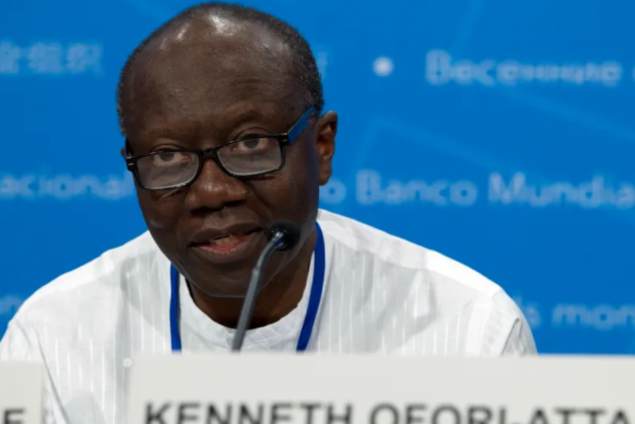Data from the Bank of Ghana indicates that Ghana’s public debt stock shot up by ¢96.1 billion in the first four months of 2023 to ¢569.3 billion in April 2023, approximately 71.1% of Gross Domestic Product (GDP).
This is equivalent to $52 billion.
The increase in the debt stock was largely due to the depreciation of the cedi within the period and to some extent an increase in domestic debt by ¢15.6 billion in the first four months of this year.
The debt stock stood at ¢473.2 billion in December 2022, approximately 77.5% of GDP.
According to the July 2023 Summary of Economic and Financial Data, Ghana’s debt in cedi terms rose to ¢547.8 billion ($50.7 billion) at the end of January 2023 and subsequently to ¢564.1 billion ($51.2 billion) and ¢569.5 billion ($51.7 billion) in February 2023 and March 2023 respectively.
The data from the Central Bank also disclosed that the external component of the total public debt stood at $29.3 billion (¢321.4 billion) in April 2023, higher than the $29.0 billion (¢240.9 billion) in December 2022.
In terms of the domestic debt, it stood at ¢247.9 billion at the end of April 2023, about 30.9% of GDP. This is compared with ¢232.3 billion in December 2022, approximately 38.1% of GDP.
The report again failed to provide data for the financial sector resolution debt and other liabilities such as the energy sector debt.
Nominal GDP surge ¢262.9bn in March 2023
Meanwhile, Ghana’s nominal GDP rose by ¢190.7 billion in December 2022 to ¢800.9 billion in April 2023.
The significant rise in Ghana’s nominal GDP can be largely attributed to the elevated prices of goods and services produced within the country. These price increases, in turn, were a result of persistently high inflation rates.
Fiscal deficit to GDP stood at 0.8% in March 2023
The government’s fiscal deficit to GDP stood at 1.8% in April 2023, as against 8.3% of GDP in December 2022.
The primary balance stood at 0.7% of GDP in April 2023
Ghana suspended payment of loans to its external creditors in December 2022, as the country struggled to rebalance the economy.
It subsequently restructured some domestic debt in February 2023.
This paved the way for the Executive Board of the International Monetary Fund to approve a $3 billion Extended Credit Facility (ECF) programme.
In June 2023, the country reached an agreement with banks to restructure ¢15 billion ($1.36 billion) of locally issued U.S. dollar bonds and cocoa bills.
It is now left for the nation to reach an agreement with its external creditors before restructuring the external debt.
Latest Stories
-
All set for Joy FM Prayer Summit for Peace 2024
4 mins -
Managing Prediabetes with the Help of a Dietitian
23 mins -
Joy FM listeners criticise Achiase Commanding Officer’s election comment
44 mins -
Legal Aid Commission employees threaten strike over poor working conditions
46 mins -
Ghana ranked 7th globally as biggest beneficiary of World Bank funding
56 mins -
IMF board to disburse $360m to Ghana in December after third review
1 hour -
Former Bono Regional NPP organiser donates 13 motorbikes to 12 constituencies
1 hour -
Securities industry: Assets under management estimated at GH¢81.7bn in quarter 3, 2024
1 hour -
Gold Fields Ghana Foundation challenges graduates to maximise benefits of community apprenticeship programme
3 hours -
GBC accuses Deputy Information Minister Sylvester Tetteh of demolishing its bungalow illegally
3 hours -
Boost for education as government commissions 80 projects
3 hours -
NAPO commissions library to honour Atta-Mills’ memory
3 hours -
OmniBSIC Bank champions health and wellness with thriving community walk
3 hours -
Kora Wearables unveils Neo: The Ultimate Smartwatch for Ghana’s tech-savvy and health-conscious users
3 hours -
NDC supports Dampare’s ‘no guns at polling stations’ directive
3 hours

